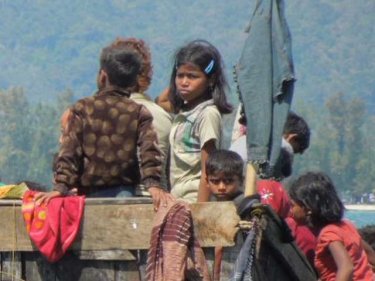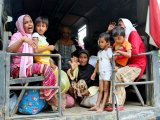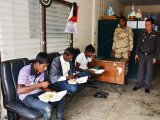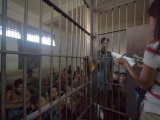PHUKET: The Royal Thai Navy is expected to announce today its strategy for interception of refugee boats off Thailand as the beginning of the annual ''sailing season'' draws near.
Amnesty International also deals with the seaborne refugees today, asserting in a media release that thousands more Rohingya and Bangladeshis could have died at sea than originally estimated.
The Navy strategy for dealing with the boatpeople focuses on a floating Operations Centre for Patrol and Humanitarian Assistance to Irregular Migrants in the Indian Ocean (OCPHAM).
Food, water, mechanical and medical help will be given to boats making their way to ''a third country,'' says a Navy media release.
Thailand's Navy previously operated a ''help on'' policy, with less transparency. Boats were given food, water and other assistance on condition they did not land in Thailand.
Yet far from being helped to another country, thousands of boatpeople have in past ''sailing seasons'' arrived without official detection in Thailand to become the victims of brutal human traffickers.
Since 2009, Phuketwan reports have established, the blind eyes turned by authorities have allowed a multi-billion baht trade in people to flourish.
It eventually ceased amid international uproar with the discovery in May of secret jungle camps and mass graves along the Thai-Malaysia border and on islands off the Andaman holiday coast.
Although there have been reports of a few small boats leaving Myanmar (Burma) in the past few days, the dangerous monsoon season is fading but has not yet concluded.
NGOs mostly see Myanmar's unwanted Rohingya, many of whom have already been forced into apartheid-style camps, waiting for the results of the November 8 national election in the hope that a new government might revise its approach to the stateless Muslim minority.
Stakeholders from around the region met in Bangkok at a summit in May and the clear message was that that Myanmar must stop the boats to end the regional discord created by its ethnic cleansing.
Southeast Asia: Persecuted Rohingya refugees from Myanmar suffer horrific abuses at sea
.. Women, men and children trafficked, held in hellish conditions, beaten or killed for ransom
.. Fears that hundreds, maybe thousands, more refugees and migrants have perished at sea than first estimated
.. New ''sailing season'' crisis looms in Bay of Bengal and Andaman Sea
ROHINGYA WOMEN, men and children attempting to flee persecution in Myanmar by boat earlier this year were killed or severely beaten by human traffickers if their families failed to pay ransoms, and kept in hellish, inhuman conditions, Amnesty International reveals in a new report today.
'Deadly journeys: The refugee and trafficking crisis in Southeast Asia' is based on interviews with more than 100 Rohingya refugees - mainly victims of human trafficking, and many of them children - who reached Indonesia after fleeing Myanmar or Bangladesh across the Andaman Sea.
With the monsoon over and a new ''sailing season'' already underway, thousands more could be taking to boats. Amnesty International is urging regional governments to urgently step up their response to the crisis.
''The daily physical abuse faced by Rohingya who were trapped on boats in the Bay of Bengal and Andaman Sea is almost too horrific to put into words. They had escaped Myanmar, but had only traded one nightmare for another. Even children were not spared these abuses,'' said Anna Shea, Refugee Researcher at Amnesty International.
''The shocking truth is that those we spoke to are the 'lucky' ones who made it to shore - countless others perished at sea or were trafficked into forced labor situations. Governments must do more to prevent this human tragedy from recurring.''
The harrowing events that enfolded in May 2015 - triggered by Thailand's crackdown on human trafficking, and the traffickers' subsequent abandonment of people at sea - left thousands of refugees and migrants stranded for weeks in desperate need of food, water and medical care.
While the UN estimates that at least 370 people lost their lives between January and June 2015, Amnesty International believes the true figure to be much higher. Eyewitnesses who spoke to Amnesty International saw dozens of large boats full of refugees and migrants in similar circumstances, but only five boats landed in Indonesia and Malaysia according to UN sources. Hundreds - if not thousands - of people remain unaccounted for, and may have died during their journeys or been sold for forced labor.
Deaths and beatings for money
MANY Rohingya said that they had seen crew members kill people when their families failed to pay ransoms. Some people were shot by the traffickers on the boats while others were thrown overboard and left to drown. Others died because of lack of food and water or disease.
Refugees described how they were kept for months on very large boats and severely beaten while traffickers contacted their family members, demanding a ransom. One 15-year-old Rohingya girl said the crew called her father in Bangladesh, made him listen to her cries while they beat her, and told him to pay them about US$1700.
Virtually every Rohingya woman, man and child said they had either been beaten themselves or seen others suffer serious physical abuse. People were beaten with metal or plastic batons - sometimes for several hours - simply for begging for food, moving or asking to use the toilet. Many have been left with long-term physical or psychological scars from the violence.
Beatings were often carried out in a chillingly routine and systematic way. One 15-year old Rohingya boy said: ''In the morning you were hit three times. In the afternoon you were hit three times. At night you were hit nine times.''
Persecuted at home
ROHINGYA desperation stems from decades of persecution and discrimination in Myanmar, where they are effectively denied citizenship under national law. Waves of violence against the Rohingya, most recently erupting in 2012, have forced tens of thousands into overcrowded camps where they live in desperate conditions.
Some people said that they had been abducted by traffickers in Myanmar or Bangladesh, others had been promised a safe passage to Malaysia for a nominal fee - a tactic commonly used by traffickers looking to coerce people into forced labor.
''The Rohingya are so desperate that they will continue to risk their lives at sea until the root causes of this crisis are addressed - the Myanmar government must immediately end its persecution of the Rohingya,'' said Anna Shea.
Hellish conditions
THE ROHINGYA were kept in inhuman and degrading conditions during their journeys. Boats were severely overcrowded, with people forced to sit in extremely cramped positions, sometimes for months on end. A local man who helped rescue people off the coast of Aceh in Indonesia said that the stench was so bad that rescuers could not board.
Food and water was severely lacking and rations usually consisted of a small cup of rice per day. Many of the Rohingya who reached Indonesia were emaciated, had difficulty walking after being cramped for so long, and suffered from dehydration, malnourishment, bronchitis, and flu.
Conditions in Indonesia
IN MAY 2015, Indonesia, Malaysia and Thailand initially pushed overcrowded vessels back from their shores and prevented thousands of desperate passengers from disembarking. Following international criticism, Indonesia and Malaysia eventually agreed to admit a number of asylum-seekers, on the condition that another country accept them by May 2016.
Indonesia should be recognised for devoting resources to housing hundreds of vulnerable people in its Aceh province, and working to fulfill their basic needs in cooperation with local civil society and international agencies. But there are serious unanswered questions about a long-term solution, as the government has not clarified whether the refugees can stay beyond May 2016.
Recommendations
''Without cooperation between governments to combat human trafficking, grave human rights abuses will again be perpetrated against some of Southeast Asia's most vulnerable and desperate people,'' said Anna Shea.
''Governments must ensure that initiatives against traffickers do not put people's lives or human rights at risk, which is what happened in May 2015. They must also act quickly to implement maritime search and rescue operations.''
Amnesty International is urging Southeast Asian states to act now, and not wait for another human rights disaster at sea.
The Phuket Provincial Court has given the Royal Thai Navy extra time to October 30 in which to consider an appeal against the dismissal of criminal defamation and computer crimes charges brought against Alan Morison, Chutima Sidasathian and Phuketwan's parent company, Big Island Media. The charges related to Phuketwan reproducing word for word a paragraph about Rohingya trafficking from a series by Reuters news agency journalists that later won a Pulitzer Prize.
Amnesty International also deals with the seaborne refugees today, asserting in a media release that thousands more Rohingya and Bangladeshis could have died at sea than originally estimated.
The Navy strategy for dealing with the boatpeople focuses on a floating Operations Centre for Patrol and Humanitarian Assistance to Irregular Migrants in the Indian Ocean (OCPHAM).
Food, water, mechanical and medical help will be given to boats making their way to ''a third country,'' says a Navy media release.
Thailand's Navy previously operated a ''help on'' policy, with less transparency. Boats were given food, water and other assistance on condition they did not land in Thailand.
Yet far from being helped to another country, thousands of boatpeople have in past ''sailing seasons'' arrived without official detection in Thailand to become the victims of brutal human traffickers.
Since 2009, Phuketwan reports have established, the blind eyes turned by authorities have allowed a multi-billion baht trade in people to flourish.
It eventually ceased amid international uproar with the discovery in May of secret jungle camps and mass graves along the Thai-Malaysia border and on islands off the Andaman holiday coast.
Although there have been reports of a few small boats leaving Myanmar (Burma) in the past few days, the dangerous monsoon season is fading but has not yet concluded.
NGOs mostly see Myanmar's unwanted Rohingya, many of whom have already been forced into apartheid-style camps, waiting for the results of the November 8 national election in the hope that a new government might revise its approach to the stateless Muslim minority.
Stakeholders from around the region met in Bangkok at a summit in May and the clear message was that that Myanmar must stop the boats to end the regional discord created by its ethnic cleansing.
Amnesty International's Report
Southeast Asia: Persecuted Rohingya refugees from Myanmar suffer horrific abuses at sea
.. Women, men and children trafficked, held in hellish conditions, beaten or killed for ransom
.. Fears that hundreds, maybe thousands, more refugees and migrants have perished at sea than first estimated
.. New ''sailing season'' crisis looms in Bay of Bengal and Andaman Sea
ROHINGYA WOMEN, men and children attempting to flee persecution in Myanmar by boat earlier this year were killed or severely beaten by human traffickers if their families failed to pay ransoms, and kept in hellish, inhuman conditions, Amnesty International reveals in a new report today.
'Deadly journeys: The refugee and trafficking crisis in Southeast Asia' is based on interviews with more than 100 Rohingya refugees - mainly victims of human trafficking, and many of them children - who reached Indonesia after fleeing Myanmar or Bangladesh across the Andaman Sea.
With the monsoon over and a new ''sailing season'' already underway, thousands more could be taking to boats. Amnesty International is urging regional governments to urgently step up their response to the crisis.
''The daily physical abuse faced by Rohingya who were trapped on boats in the Bay of Bengal and Andaman Sea is almost too horrific to put into words. They had escaped Myanmar, but had only traded one nightmare for another. Even children were not spared these abuses,'' said Anna Shea, Refugee Researcher at Amnesty International.
''The shocking truth is that those we spoke to are the 'lucky' ones who made it to shore - countless others perished at sea or were trafficked into forced labor situations. Governments must do more to prevent this human tragedy from recurring.''
The harrowing events that enfolded in May 2015 - triggered by Thailand's crackdown on human trafficking, and the traffickers' subsequent abandonment of people at sea - left thousands of refugees and migrants stranded for weeks in desperate need of food, water and medical care.
While the UN estimates that at least 370 people lost their lives between January and June 2015, Amnesty International believes the true figure to be much higher. Eyewitnesses who spoke to Amnesty International saw dozens of large boats full of refugees and migrants in similar circumstances, but only five boats landed in Indonesia and Malaysia according to UN sources. Hundreds - if not thousands - of people remain unaccounted for, and may have died during their journeys or been sold for forced labor.
Deaths and beatings for money
MANY Rohingya said that they had seen crew members kill people when their families failed to pay ransoms. Some people were shot by the traffickers on the boats while others were thrown overboard and left to drown. Others died because of lack of food and water or disease.
Refugees described how they were kept for months on very large boats and severely beaten while traffickers contacted their family members, demanding a ransom. One 15-year-old Rohingya girl said the crew called her father in Bangladesh, made him listen to her cries while they beat her, and told him to pay them about US$1700.
Virtually every Rohingya woman, man and child said they had either been beaten themselves or seen others suffer serious physical abuse. People were beaten with metal or plastic batons - sometimes for several hours - simply for begging for food, moving or asking to use the toilet. Many have been left with long-term physical or psychological scars from the violence.
Beatings were often carried out in a chillingly routine and systematic way. One 15-year old Rohingya boy said: ''In the morning you were hit three times. In the afternoon you were hit three times. At night you were hit nine times.''
Persecuted at home
ROHINGYA desperation stems from decades of persecution and discrimination in Myanmar, where they are effectively denied citizenship under national law. Waves of violence against the Rohingya, most recently erupting in 2012, have forced tens of thousands into overcrowded camps where they live in desperate conditions.
Some people said that they had been abducted by traffickers in Myanmar or Bangladesh, others had been promised a safe passage to Malaysia for a nominal fee - a tactic commonly used by traffickers looking to coerce people into forced labor.
''The Rohingya are so desperate that they will continue to risk their lives at sea until the root causes of this crisis are addressed - the Myanmar government must immediately end its persecution of the Rohingya,'' said Anna Shea.
Hellish conditions
THE ROHINGYA were kept in inhuman and degrading conditions during their journeys. Boats were severely overcrowded, with people forced to sit in extremely cramped positions, sometimes for months on end. A local man who helped rescue people off the coast of Aceh in Indonesia said that the stench was so bad that rescuers could not board.
Food and water was severely lacking and rations usually consisted of a small cup of rice per day. Many of the Rohingya who reached Indonesia were emaciated, had difficulty walking after being cramped for so long, and suffered from dehydration, malnourishment, bronchitis, and flu.
Conditions in Indonesia
IN MAY 2015, Indonesia, Malaysia and Thailand initially pushed overcrowded vessels back from their shores and prevented thousands of desperate passengers from disembarking. Following international criticism, Indonesia and Malaysia eventually agreed to admit a number of asylum-seekers, on the condition that another country accept them by May 2016.
Indonesia should be recognised for devoting resources to housing hundreds of vulnerable people in its Aceh province, and working to fulfill their basic needs in cooperation with local civil society and international agencies. But there are serious unanswered questions about a long-term solution, as the government has not clarified whether the refugees can stay beyond May 2016.
Recommendations
''Without cooperation between governments to combat human trafficking, grave human rights abuses will again be perpetrated against some of Southeast Asia's most vulnerable and desperate people,'' said Anna Shea.
''Governments must ensure that initiatives against traffickers do not put people's lives or human rights at risk, which is what happened in May 2015. They must also act quickly to implement maritime search and rescue operations.''
Amnesty International is urging Southeast Asian states to act now, and not wait for another human rights disaster at sea.
Declaration of Interest
The Phuket Provincial Court has given the Royal Thai Navy extra time to October 30 in which to consider an appeal against the dismissal of criminal defamation and computer crimes charges brought against Alan Morison, Chutima Sidasathian and Phuketwan's parent company, Big Island Media. The charges related to Phuketwan reproducing word for word a paragraph about Rohingya trafficking from a series by Reuters news agency journalists that later won a Pulitzer Prize.










